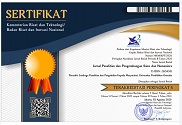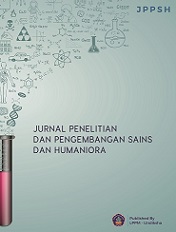THE IMPLICATION OF ETHNOMEDICAL UNDERSTANDING ON THE CONSERVATION OF MEDICINAL PLANTS VOCABULARY IN THE SOUTH KUTA COMMUNITY
DOI:
https://doi.org/10.23887/jppsh.v3i1.17360Keywords:
implication, ethnomedical, preservation of vocabularyAbstract
This study aimed to find out (1) ethnomedical understanding on the conservation of medicinal plants vocabulary in the South Kuta community, (2) the implication of ethnomedical understanding on the conservation of medicinal plants vocabulary in the South Kuta community. The design of this study was descriptive research design. The subjects in this study were 200 people. The objects in this study were in the form of understanding of the ethnomedical vocabulary, medicinal plants, and the implications of ethnomedical understanding on the preservation of vocabulary on traditional medicinal plants. Data collection were conducted by distributing questionnaires, interviews, document recording, and observation. Data analyses were conducted by the descriptive method of quantitative and qualitative. The presentation was done formally and informally. The results showed that the percentage of understanding which was very dominant or above 50%are aloe vera, turmeric, ginger, and kencur. The implications of ethnomedical understanding on vocabulary preservation of medicinal plants for the people of South Kuta include vocabulary linkages, the making of traditional medicines, the making and utilization of them, such as the manufacture and use of herbs for traditional medicine made from turmeric, dadap, aloe vera, ginger, and kencur. Making vegetables, from Moringa leaves, and dadap which is mashed and pasted/smeared, andong, dadap, kelor, turmeric, ginger, kencur. In addition, the manufacture of scrubs from turmeric, and kencur. Words of traditional medicinal plants which were not listed in implication mean the community just understood or knew but the implementation related to ethnomedical had not been done. In short, the percentage of public understanding which is dominant or above 50% is the understanding of the word of aloe vera, turmeric, ginger, and kencur. The implications of the ethnomedical understanding of vocabulary preservation of medicinal plants of the people of South Kuta include the linkage of vocabulary to the manufacture of traditional medicines and their utilization, such as the manufacture and use of herbs for traditional medicine made from turmeric, dadap, aloe vera, ginger, and kencur.Downloads
Published
2019-04-24
Issue
Section
Articles
License
Authors who publish with the Jurnal Penelitian dan Pengembangan Sains dan Humaniora agree to the following terms:
- Authors retain copyright and grant the journal the right of first publication with the work simultaneously licensed under a Creative Commons Attribution License (CC BY-SA 4.0) that allows others to share the work with an acknowledgment of the work's authorship and initial publication in this journal.
- Authors are able to enter into separate, additional contractual arrangements for the non-exclusive distribution of the journal's published version of the work (e.g., post it to an institutional repository or publish it in a book), with an acknowledgment of its initial publication in this journal.
- Authors are permitted and encouraged to post their work online (e.g., in institutional repositories or on their website) prior to and during the submission process, as it can lead to productive exchanges, as well as earlier and greater citation of published work. (See The Effect of Open Access)









